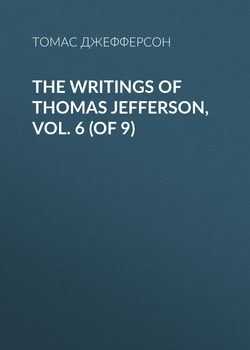Читать книгу The Writings of Thomas Jefferson, Vol. 6 (of 9) - Томас Джефферсон, Thomas Jefferson - Страница 52
PART III.—Continued.
LETTERS WRITTEN AFTER HIS RETURN TO THE U. S. DOWN TO THE TIME OF HIS DEATH.
1790-1826
TO MR. RONALDSON
ОглавлениеMonticello, Jan. 12, 1813.
Dear Sir,—Your favor of November 2d arrived a little before I sat out on a journey on which I was absent between five and six weeks. I have still therefore to return you my thanks for the seeds accompanying it, which shall be duly taken care of, and a communication made to others of such as shall prove valuable. I have been long endeavoring to procure the Cork tree from Europe, but without success. A plant which I brought with me from Paris died after languishing some time, and of several parcels of acorns received from a correspondent at Marseilles, not one has ever vegetated. I shall continue my endeavors, although disheartened by the nonchalance of our southern fellow citizens, with whom alone they can thrive. It is now twenty-five years since I sent them two shipments (about 500 plants) of the Olive tree of Aix, the finest Olives in the world. If any of them still exist, it is merely as a curiosity in their gardens, not a single orchard of them has been planted. I sent them also the celebrated species of Sainfoin,3 from Malta, which yields good crops without a drop of rain through the season. It was lost. The upland rice which I procured fresh from Africa and sent them, has been preserved and spread in the upper parts of Georgia, and I believe in Kentucky. But we must acknowledge their services in furnishing us an abundance of cotton, a substitute for silk, flax and hemp. The ease with which it is spun will occasion it to supplant the two last, and its cleanliness the first. Household manufacture is taking deep root with us. I have a carding machine, two spinning machines, and looms with the flying shuttle in full operation for clothing my own family; and I verily believe that by the next winter this State will not need a yard of imported coarse or middling clothing. I think we have already a sheep for every inhabitant, which will suffice for clothing, and one-third more, which a single year will add, will furnish blanketing. With respect to marine hospitals, which are one of the subjects of your letter, I presume you know that such establishments have been made by the general government in the several States, that a portion of seaman's wages is drawn for their support, and the government furnishes what is deficient. Mr. Gallatin is attentive to them, and they will grow with our growth. You doubt whether we ought to permit the exportation of grain to our enemies; but Great Britain, with her own agricultural support, and those she can command by her access into every sea, cannot be starved by withholding our supplies. And if she is to be fed at all events, why may we not have the benefit of it as well as others? I would not, indeed, feed her armies landed on our territory, because the difficulty of inland subsistence is what will prevent their ever penetrating far into the country, and will confine them to the sea coast. But this would be my only exception. And as to feeding her armies in the peninsula, she is fighting our battles there, as Bonaparte is on the Baltic. He is shutting out her manufactures from that sea, and so far assisting us in her reduction to extremity. But if she does not keep him out of the peninsular, if he gets full command of that, instead of the greatest and surest of all our markets, as that has uniformly been, we shall be excluded from it, or so much shackled by his tyranny and ignorant caprices, that it will become for us what France now is. Besides, if we could, by starving the English armies, oblige them to withdraw from the peninsular, it would be to send them here; and I think we had better feed them there for pay, than feed and fight them here for nothing. A truth, too, not to be lost sight of is, that no country can pay war taxes if you suppress all their resources. To keep the war popular, we must keep open the markets. As long as good prices can be had, the people will support the war cheerfully. If you should have an opportunity of conveying to Mr. Heriot my thanks for his book, you will oblige me by doing it. Accept the assurance of my great esteem and respect.
3
Called Sulla.
